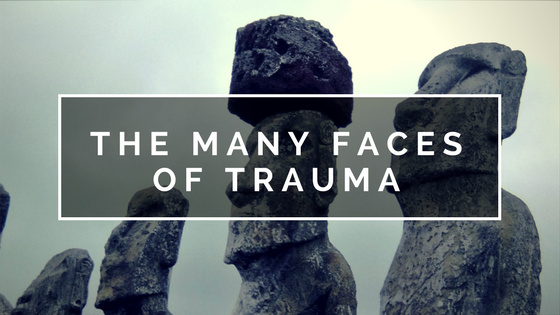We’ve talked on this blog before about the various signs and symptoms of trauma you might experience. In that article, I referenced the difference between what I called “big T” traumas and “small t” traumas. But how do we categorize those different events? Maybe you’ve had the experience where something you thought was “normal” ended up having a greater negative impact on you. What types of events can be defined as traumatic? How do different stressful life events affect how we process and deal with trauma?
“Big T” traumas
A “big T” trauma is a uniquely identifiable and significant distressing event. You might immediately associate these type of events with post-traumatic stress disorder (PTSD). PTSD involves a cluster of symptoms that interfere with daily life, including: exposure to a traumatic event, re-experiencing through flashbacks or intrusive thoughts, avoidance of reminders of the traumatic event, negative thoughts about self or others, and heightened reactivity. Significant traumas such as these can lead to feelings of isolation, due to the distinctive nature of these events. The individual who experienced this trauma may also feel a greater pull to avoid reminders of the trauma and experience a sense of helplessness over circumstances.
Recently, we’ve been faced with horrendous scenes of destruction in the wake of two major hurricanes that ripped through the southern states of our country. It is easy to see the effects of these major events as trauma that affects the individuals whose homes were damaged or destroyed and who are now displaced.
Examples of “big T” traumas include:
Physical or sexual abuse in childhood or adulthood
Sexual assault
Natural disasters
Sudden and unexpected death of a loved one
Witnessing the death or injury of someone else, particularly a loved one
Domestic violence
Robbery
War
Military service/combat
Acts of terrorism
Car or airplane accidents
“Small t” traumas
“Small t” traumas are distressing events that are smaller in scale than “big T” traumas, but often occur over a more prolonged period of time. These traumas are more persistent and subtle than the “big T” traumas, and can be just as painful as a result. They are especially impactful for those who experience them in childhood. While typically those who have faced these types of trauma do not have enough criteria to be diagnosed with PTSD, they may experience symptoms of trauma that mimic the characteristics of this disorder.
I imagine this type of trauma like a series of waves in the ocean. The first time the waves sweep your feet out from under you, it’s relatively easy to recover. Once you’ve regained your footing and tried to stand, however, you find you've been knocked off your feet again as the current pushes another wave toward you. Before long, you become exhausted by the process of trying to stand up to the current. "Small t" traumas are often minimized by the individuals who are facing them because they do not carry the label of a significant trauma, but this persistent nature is just as impactful as the “big T” traumas.
examples of “small t” traumas include:
Betrayal/infidelity by a spouse
Emotional abuse in childhood or adulthood
Non life-threatening injuries
Family or work conflict
Bullying or harassment
Divorce
Loss of a significant relationship
Sudden relocation/moving
Legal issues
Loss of a job
Financial distress/poverty
Being the child/spouse of an addict or individual with mental illness
Ongoing parental criticism
Parental disconnection and disengagement
Life Stressors
Sometimes even positive life experiences can create increased stress levels that lead to distress or anxiety and compound the symptoms associated with a more major trauma. The Holmes and Rahe stress inventory is a measurement used to identify how some stressors (which can be either “small t” traumas or positive events that created a pattern of stress) may be affecting you today. The interactive survey here helps you to identify how stressful life events have impacted you this past year.
Examples of significant life stressors include:
Planning a wedding/getting married
Starting a new job
Moving across the country
Having/adopting a child
Holidays
Each of these traumatic or stressful situations is handled uniquely by different people. How you respond to trauma is related to your predisposition and personality. However, one factor that has been shown to affect the experience of traumatic symptoms is avoidance. The more a person avoids the traumatic experience, the more likely they are to integrate that trauma into their psyche and have a harder time recovering. Instead of choosing to avoid the pain , allow yourself to feel impacted by it and seek the help you need. These traumatic events can be painful, and they deserve care and compassion.


